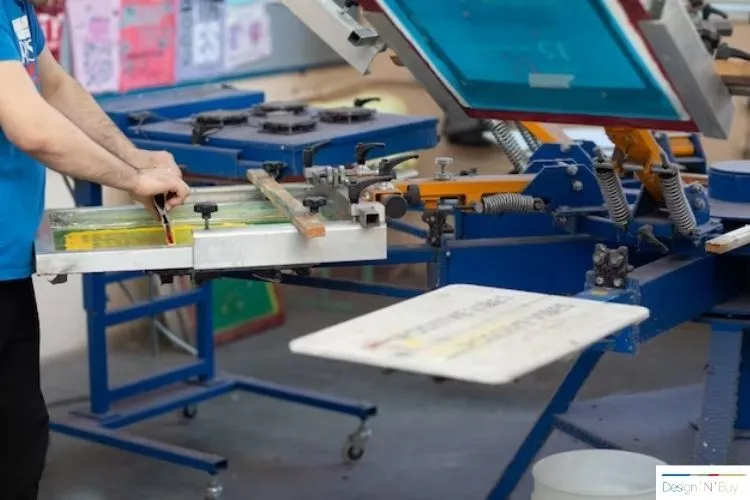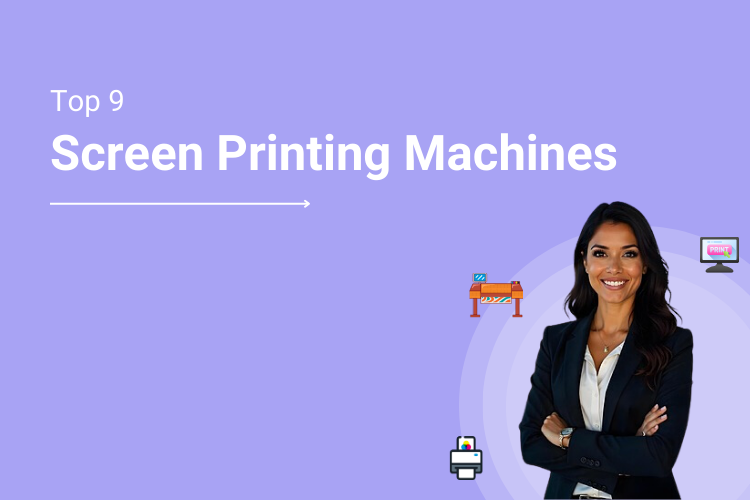Screen printing has become a popular and profitable business in recent years. Whether you’re starting a new screen printing business or looking to purchase or upgrade your existing equipment, finding the best screen printing machine is crucial.
Top 9 Best Screen Printing Machine
Now, let’s dive into the review of the 9 best screen printing machines of 2025. These machines have been carefully selected based on their features, performance, price, and customer reviews.
1. M&R:
M&R is known for its wide range of screen printing equipment, including automatic press and manual presses.
Both series offer advanced features, high-speed production, and exceptional print quality, making them ideal for professional screen printers.
M&R Sportsman Series: Starting from $20,000
M&R Pros:
Automation: It includes an automatic screen printing machine, which increases production efficiency and reduces labor costs.
Precision: These machines are designed for high-precision printing, ensuring consistent and accurate results.
Multiple Stations: They come with multiple print stations, allowing multi-color designs without manual intervention between colors.
User-Friendly: They are known for their user-friendly interfaces and controls, making them accessible to operators with varying experience levels.
M&R Cons:
Cost: Automatic screen printing machines, including the Sportsman series, have higher upfront costs than manual presses.
Maintenance: Automatic machines require more maintenance and servicing than manual presses due to their complexity.
M&R Challenger Series: Starting from $40,000
M&R Pros:
Flexibility: It offers both manual and automatic screen printing machines, giving you options based on your production requirements and budget.
Quality: M&R produces high-quality equipment, so challenger machines provide reliable and consistent results.
Customization: Some Challenger models might offer customization options based on your specific needs.
M&R Cons:
Manual vs. Automatic: The Challenger series includes both manual and automatic machines, so the pros and cons can vary depending on the specific model you’re considering.
Price: As with any quality screen printing equipment, M&R machines can be relatively expensive, particularly automatic models.
When starting a t-shirt business there are a lot of decisions to make. DesignNBuy has everything you need to streamline your print shop in one place.
2. Ryonet / Riley Hopkins
Riley Hopkins is a Ryonet brand of printer that offers manual as well as automatic screen printing presses.
The Riley Hopkins 150 and Riley Hopkins 300 series are popular choices for their durability, versatility, and user-friendly features.
Riley Hopkins 150: Starting from $1,190
Ryonet Pros:
Affordability: It is often considered an entry-level press, making it more affordable and accessible for those accustomed to screen printing or on a tight budget.
Compact Size: This press is relatively compact and suitable for smaller spaces, making it a suitable option for home-based or small businesses.
User-Friendly: Riley Hopkins presses are known for their user-friendly design, which can benefit beginners learning screen printing.
Ryonet Cons:
Limited Color Capacity: It is typically a 1-color or 4-color press, which might not be suitable for intricate multi-color designs.
- Manual Operation: The press requires manual operation for both printing and rotating the pallets, which can be time-consuming for larger production runs.
Riley Hopkins 300: Starting from $2,499
Ryonet Pros:
Increased Color Capacity: It typically offers more color options, which can be advantageous for designs with multiple colors.
Manual Precision: Manual presses allow precise control over the printing process, which leads to high-quality results.
Expandable: Some models in the 300 series might be expandable, allowing you to add additional print stations as your business grows.
Ryonet Cons:
Limited Automation: Manual presses lack the automation features of more advanced models, which impacts efficiency.
Learning Curve: While user-friendly, manual presses still require skill and practice to achieve consistent and professional prints.
3. Anatol
The Anatol Volt, Horizon, and Titan series are renowned for their exceptional performance, precision, and durability.
These machines offer advanced automation features, high-speed printing capabilities, and superior print resolution, making them ideal for both small businesses and large-scale operations. Whether you’re printing on textiles or graphics, the Anatol screen printing machine delivers outstanding results.
Anatol Volt Series: Starting from $20,000
Anatol Pros:
Affordability: The Volt series might offer cost-effective options for businesses with budget constraints.
Automation: Depending on the model, the Volt series might have automation features that improve efficiency.
Entry-Level Options: Suitable for small businesses or those introducing themselves to screen printing.
Anatol Cons:
Limited Features: Lower-cost models might have fewer advanced features than higher-end series.
Production Capacity: Might not be as suitable for large-scale production due to lower automation.
Anatol Titan Series: Starting from $18,000
Anatol Pros:
High Performance: The Titan series is likely designed for high-volume and high-quality production.
Advanced Features: Offer advanced automation and technology for efficient and precise printing.
Durability: Designed for heavy use, potentially suitable for demanding production environments.
Anatol
Cons:
Cost: The Titan series machines are likely to be among the more expensive options.
Complexity: Advanced features require skilled operators and training.
Allow customers to personalize your products with ease
Web to print software lets businesses create online stores where customers design and order custom prints, like brochures or t-shirts. It boosts sales, saves time, and keeps customers happy.
4. Workhorse
Workhorse is a trusted name in the screen printing industry, and their Sabre series and Mach models are no exception. These machines combine rugged and durable construction, user-friendly features, and impressive print speeds to deliver exceptional results.
The Workhorse screen printing machines are known for their reliability and performance, ensuring that your prints are always of the highest quality.
Workhorse Sabre Series: Starting from $25,000
Workhorse Pros:
Advanced Automation: It is known for its advanced automation features, which can improve production efficiency.
Precision: Automation can lead to more accurate and consistent printing results.
High-Quality Prints: The advanced features can contribute to producing high-quality prints.
Versatility: Suitable for various substrates and applications due to the advanced technology.
Workhorse Cons:
Cost: The advanced automation and features might come with a higher price point compared to less automated models.
Learning Curve: The sophisticated features might require training to operate effectively.
Maintenance: The more advanced the features, the more important it is to keep up with maintenance to ensure consistent performance.
Workhorse Mach Series: Starting from $20,000
Workhorse Pros:
Automation Options: The Mach series offers a range of automation levels to match different production needs and budgets.
Efficiency: Automation can lead to faster production rates and reduced labor costs.
Quality: Depending on the model, the Mach series can offer good print quality.
Workhorse Cons:
Cost Variability: Different levels of automation come with different costs, and more automated models might be more expensive.
Complexity: Highly automated models might require training and technical expertise to operate effectively.
Initial Investment: The upfront cost of automated machines can be higher compared to manual or less automated models.
5. The Vastex
Vastex is another reputable brand that consistently produces top-quality screen printing machine. The V-1000 and V-2000 series stand out for their user-friendly design, precise machine registration, and versatility.
These machines offer effortless adjustments and compatibility with various substrates, fabrics and inks, allowing you to achieve professional-level prints with ease.
Vastex V-1000 Series: Starting from $1,000
Vastex Pros:
Precision: The V-1000 series is known for its manual precision, allowing for accurate and controlled printing.
Entry-Level: Suitable for smaller businesses or those new to screen printing, offering a more budget-friendly option.
Versatility: Can accommodate various substrates and sizes, making it versatile for different printing needs.
Vastex Cons:
Limited Automation: Being a manual press, this series lacks the automation features of higher-end automatic machines.
Production Speed: Manual presses might not match the speed of automated models for large-scale production.
Labor Intensity: Printing manually can be more labor-intensive, impacting efficiency and production costs.
Vastex V-2000 Series: Starting from $2,000
Vastex Pros:
Adjustability: This series offers micro-registration, allowing for precise adjustments and accurate multicolor registration.
Size Options: Different models in the series offer various numbers of stations and print heads to match different production needs.
Quality: Can produce high-quality prints, especially with precise registration.
Vastex Cons:
Manual Labor: While it offers advanced features, it’s still a manual press, which can be labor-intensive for larger production runs.
Automation Lacking: This series lacks the automation and efficiency of automatic presses.
Learning Curve: Advanced features like micro-registration might require training to be used effectively.

With Design’N’Buy, you can:
√ Streamline your business processes
√ Increase productivity and reduce mistakes
√ Manage artworks and mockup files
√ Streamline customer service and communication
6. MHM
If you’re looking for an innovative and high-end screen printing machine, MHM is a brand worth considering. The S-Type and iQ-Oval series showcase MHM’s commitment to technological advancements and superior performance.
Equipped with sophisticated features like automatic screen positioning and color registration, these machines are perfect for demanding printing applications.
MHM S-Type Series: Starting from $25,000
MHM Pros:
High-End Automation: It is known for its advanced automation features, making it suitable for high-volume production with minimal manual intervention.
Precision: Advanced automation can lead to precise and consistent printing results.
Speed: The automation can significantly increase production speed, making it efficient for large runs.
Quality: Known for delivering high-quality prints due to advanced technology and precision.
MHM Cons:
Cost: These are likely to be among the higher-priced options due to their advanced automation and features.
Complexity: The advanced automation might require specialized training for operators.
- Maintenance: The more advanced the features, the more important it is to maintain the equipment for optimal performance.
MHM iQ-Oval Series: $30,000
MHM Pros:
Efficiency: The iQ-Oval series is designed for efficiency and speed, suitable for high-volume production.
Advanced Features: Offers innovations like servo-driven indexers for accurate registration and reduced setup time.
Versatility: Can handle a wide range of substrates and applications, enhancing its versatility.
MHM Cons:
Cost: The advanced technology and features might come with a higher price point compared to some other models.
Training: Operators might need training to effectively utilize the advanced features.
Initial Investment: The upfront cost of an automated press like the iQ-Oval can be significant.
7. ROQ
ROQ is a leading manufacturer of screen printing machines known for their reliability and efficiency. The ROQ Oval 4 and 6 series of printers offer exceptional print precision, quick setup times, and intuitive controls.
These machines can handle high production volumes and deliver consistent results, making them a favorite among experienced printers.
ROQ Oval Series 4: Starting from $15,000
ROQ Pros:
Innovative Design: It is known for its innovative design and features, designed to enhance efficiency and quality.
Efficiency: Automation and innovative technology contribute to streamlined and efficient production processes.
Print Quality: Known for delivering high-quality prints due to advanced technology and precise registration.
Advanced Automation: Offers advanced automation features for improved production speed and accuracy.
ROQ Cons:
Cost: The innovative design and features of the ROQ Oval series might come with a higher price point compared to some other options.
Complexity: The advanced features might require training and technical expertise to operate effectively.
Maintenance: The more advanced the features, the more important regular maintenance becomes to ensure consistent performance.
ROQ Oval Series 6: Starting from $20,000
ROQ Pros:
Efficiency: ROQ automatic machines are designed for efficiency and high-volume production.
Advanced Automation: Offers various levels of automation to match different production needs.
Innovation: Known for incorporating innovative features and technology to improve the screen printing process.
Quality: ROQ machines are often associated with delivering high-quality prints.
ROQ Cons:
Cost: Depending on the model and features, ROQ automatic machines can have a higher upfront cost.
Learning Curve: The advanced features might require training for operators.
Maintenance: Advanced automation requires proper maintenance to ensure reliable performance.
8. Miyakoshi
For those focusing on graphics or industrial printing, the Miyakoshi MSP and MPE series provide cutting-edge technology and exceptional print quality.
These machines are designed to print on various substrates, delivering vibrant colors and intricate details. Miyakoshi screen printing machines offer versatility and efficiency in production environment, making them a valuable addition to the production environment of any printing business.
MSP Series (Graphics): Starting from $10,000
Miyakoshi Pros:
Specialization: Designed specifically for graphic applications, ensuring optimal performance for graphic designs.
Print Quality: Likely to offer high-quality prints suitable for various graphic substrates.
Precise Registration: Graphic designs often require accurate registration, which the MSP series might excel at.
Diversity of Graphics: Can handle a variety of graphic printing needs.
Miyakoshi Cons:
- Specific Focus: The MSP series might be more tailored to graphic applications, potentially limiting versatility for other types of printing.
MPE Series (Industrial Printing): Starting from $20,000
Miyakoshi Pros:
Industrial Applications: It is designed for industrial printing needs, which can include labels, packaging, textiles, and more.
Versatility: Can handle a wide range of industrial substrates and applications.
Specialized Solutions: It is likely to offer solutions for unique challenges faced in industrial printing.
Miyakoshi Cons:
Specialized Focus: The focus on industrial printing might mean that it’s not as optimized for other types of printing applications.
Specific Requirements: Depending on the industry, specialized requirements and customization might be needed.

Web to Print + Your Machine:
A Match Made in Profit Heaven!
Say goodbye to minimum order headaches and hello to happy customers.
9. Antec
The Antec Legend series and Legend E models offer excellent value for money without compromising performance. These machines combine solid construction, user-friendly controls, and precise registration, ensuring superior print quality.
Whether you’re a beginner or an experienced printer, the Antec screen printing machine provides reliable and consistent results.
Antec Legend Series: Starting from $1,500
Antec Pros:
Manual and Automatic Options: This series offers both manual and automatic screen printing machines, providing flexibility for different production needs.
Variety: Different models within the series offer various features and capabilities to match different requirements.
Customization: The series likely offers options to customize the machine based on your specific needs.
Antec Cons:
Learning Curve: Some of the advanced features, especially in automatic models, might require training to operate effectively.
- Cost: Automatic models might come with a higher upfront cost compared to manual models.
Antec Legend E Series: Starting from $2,000
Antec E Series Pros:
Entry-Level Automation: This series offers a balance between automation and affordability.
Efficiency: Automation can lead to improved efficiency and reduced labor costs.
Quality: Can deliver consistent and relatively high-quality prints due to automation.
Antec E Series Cons:
Complexity: While it’s designed to be more accessible, some automation features might still require operator training.
Manual Limitations: While automated, it might not match the capabilities and features of higher-end automatic machines.
Choose the Right Screen Printing Machine for Your Screen Print Shop?

Choosing the right screen printing machine for your screen print shop can be a daunting task, but with a good option and the right guidance, it becomes much easier. Here are a few tips to help you make the right choice:
Assess Your Business Needs
Consider the volume of prints you’ll be producing, the types of materials you’ll be working with, and your budget constraints. This will help you narrow down your options.
Consider Future Growth
Factor in your long-term business goals and whether the machine can accommodate your future expansion plans.
Read Reviews and Seek Recommendations
Look for reviews and testimonials from other screen printers who have used the machines you’re considering. Their firsthand experiences can provide valuable insights.
Consult Experts
Reach out to industry experts or consult with reputable screen printing suppliers for personalized recommendations based on your specific needs.
By following these tips, you’ll be well-equipped to choose the right screen printing machine for your screen print shop and take your small business up to new heights.
Summary: Choose the best screen printing machine for you
In conclusion, choosing the best screen printing machine is vital for the success of your unique designs and your screen printing business. Consider factors such as size, durability, versatility, and ease of use when making a purchase decision.
*This Post has been Updated on January 2025.




